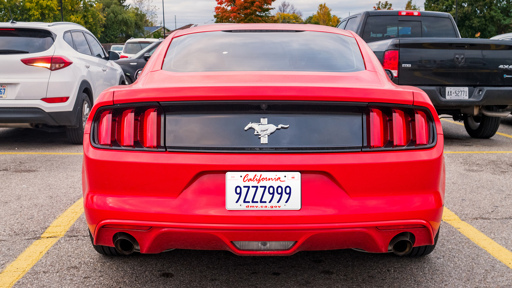Just changing to a new numbering system when they run out.
Imagine if they just stopped registering new cars and instead worked to bring back mass public transit to reduce the number of vehicles on the road.
I guess busses and trains are just too woke for CA.
Car companies like it that way just fine and lobby heavily to keep it that way
I guess busses and trains are just too woke for CA.
it has some of the best transit available in the country, and the tightest environmental regs.
which tells you the sad state of our country.
Ford should really start getting in the train business
Perfectly mildly interesting
I wonder what the practical reason is for not just allowing full alphanumeric number plates. Each digit would then have 32 possibilities (I, O, Z, and S should be avoided to prevent confusion with 1, 0, 2, and 5). This gives 34.36 billion possible number plates which seems sufficient for at least the next couple years.
Harder to remember than if they group letters and numbers.
Right now remember 1 digit that’s usually 8 or 9, then 3 letters and 3 numbers So 8WTF420 is easier to remember than WT842F0.
I guess that’s true but number plates are typically read by cameras anyway. They are primarily used by speed/red light cameras, toll collection systems, and law enforcement.
If you assign random numbers to cars, it’s pretty likely that the last four or five digits plus the make and model of the car will uniquely identify a vehicle or at least narrow it down to just a few possibilities. If the assignment software is smart it could probably even guarantee this uniqueness.
In hit and run accidents, human memory is what needs to be supported by the technology.
Therefore license plates should be designed for maximum mnemonic potential, not CPU efficiency.
Electronic plate readers are an illegitimate anti-privacy technology and should be banned imo. License plates are already too hard to remember, I have a hard time remembering my own license plate number let alone one I had a two second glance at.
Say what you will about electronic plate readers but they do make speed and red light enforcement and toll collection much easier. And be honest, most people only dislike them because they make it harder to get away with bad driving habits that people previously took for granted that they could get away with.
Well I dislike them mainly because they further enable scalable mass surveillance. There should be more barriers to having records of where everyone is. As for automated enforcement, the way it works is often a blatant scam. I once had a commute where I passed by an intersection that ticketed people turning left, the amount of time it allowed was noticeably shorter than normal, and you could see the flash indicating they were ticketing someone basically every time the light changed, for multiple cars, because it activated if you were in the intersection at all after the light turned red. There was always a long line to turn left at that intersection. I mostly avoided getting ticketed but I did get one once, it was through a private company and I just ignored it and nothing happened. I really think most of those get set up because of corrupt relationships between people in government and the people running those companies that handle the tickets.
Or put the letters and numerals in set spots, ex. ABC-123, next move onto 123-ABC once you’re done with the first bazillion combinations , AB3-12C, etc.
That way you can tell your 1 isn’t an I because it’s not in the right spot.
UK includes the year in it, so it shouldn’t ever really run out. Ok I guess eventually it will loop but I expect most will be available for reuse by then.
One issue could be if more cars are registered than the digits would make available for that year but you would probably just design it in a way there is significantly more space than you are ever realistically going to need.
We actually did loop in Denmark a decade or so ago. It was quite easy to guess the production year of the car by just looking at the first two letters. It was a bit trippy seeing new cars with "AA 11 111” all of a sudden when we ran out of ZZ’s.
In a groundbreaking move that has left statisticians baffled and motorists excited, California announces the introduction of two entirely new numbers to be used on license plates: Zebra-Stripe 9.3 and Cosmic Ray 7.8. These unprecedented figures are set to join the traditional numeric lineup, promising to solve the impending crisis just in time for 2025.
The concept of Zebra-Stripe 9.3 was inspired by the natural beauty of California’s diverse wildlife. The alternating pattern is said to mimic the striking stripes of local zebras found roaming the Golden State’s safari parks. Meanwhile, Cosmic Ray 7.8 pays homage to the state’s storied aerospace history, symbolizing its connection with the stars and infinite possibilities.
California Department of Motor Vehicles officials have confirmed that these new numbers will seamlessly integrate into existing license plate formats while ensuring a fresh wave of combinations for years to come. They also hinted at potential future collaborations with local artists and scientists to explore more creative numerals.
Residents are buzzing with excitement, as plates featuring Zebra-Stripe 9.3 and Cosmic Ray 7.8 are expected to become instant collector’s items. The DMV assures that these numbers will add a touch of whimsy and innovation to the state’s roads, reinforcing California’s reputation for breaking boundaries—both on land and beyond.
deleted by creator







